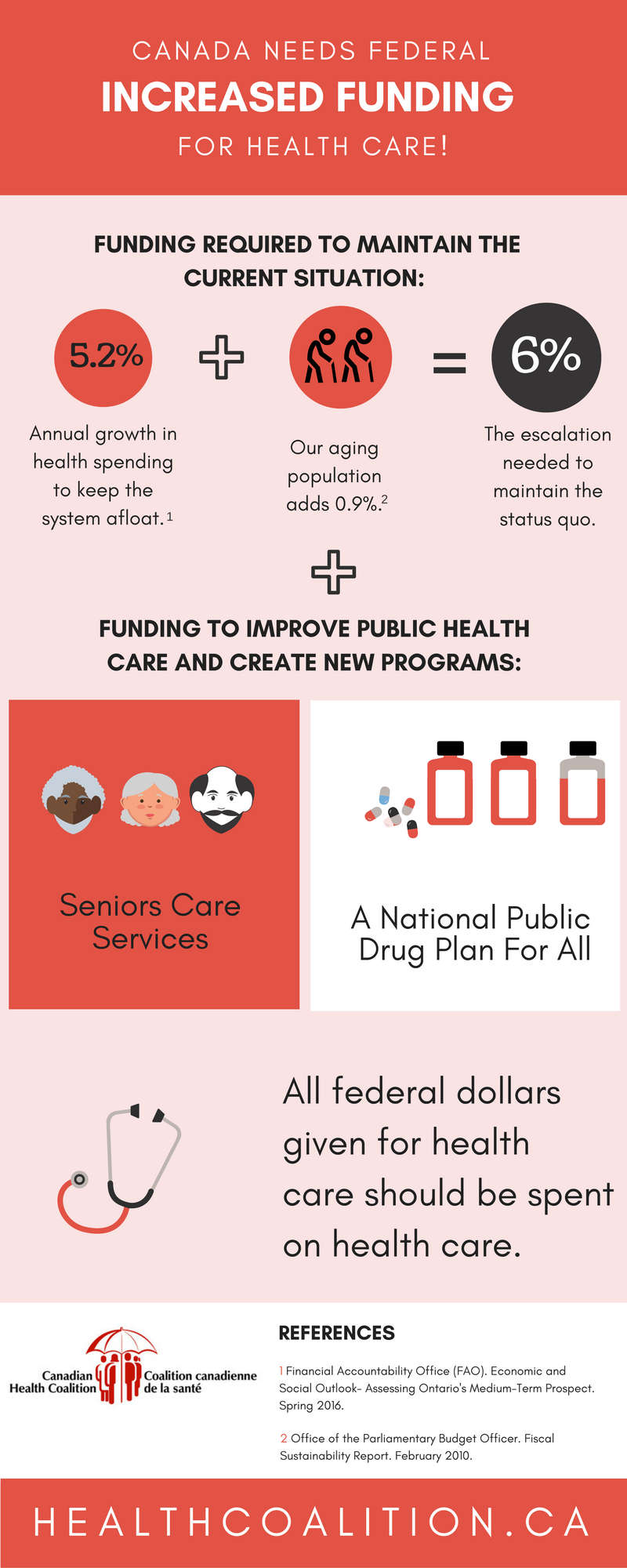Health Accord Brief
 One year into their term, the government has not given a clear direction on health care. This year we’ve witnessed the Federal government standing up for the Canada Health Act by enforcing the rules against extra billing on the province of Quebec and intervening in the Cambie Corp. vs. the BC government in front of the BC Supreme Court. But at the same time, the Minister is refusing to increase health transfers to the provinces and territories. This is likely to cause increased privatization and less care for patients. It will also greatly impede on our chances of building new programming like a national public drug plan and better seniors care.
One year into their term, the government has not given a clear direction on health care. This year we’ve witnessed the Federal government standing up for the Canada Health Act by enforcing the rules against extra billing on the province of Quebec and intervening in the Cambie Corp. vs. the BC government in front of the BC Supreme Court. But at the same time, the Minister is refusing to increase health transfers to the provinces and territories. This is likely to cause increased privatization and less care for patients. It will also greatly impede on our chances of building new programming like a national public drug plan and better seniors care.
What was once a 50-50 cost shared program between the federal and provincial governments has become 80 per cent funded by the provinces and the feds are on target to further drop their share to 18 per cent by 2024. According to the Parliamentary Budget Office and the Council of the Federation, the cut to the Canada Health Transfer (CHT) amounts to at least $36 billion in 10 years, or the equivalent of the entire 2016 CHT.
The feds are also responsible for enforcing and upholding the Canada Health Act. The mechanism for enforcing obedience to the Act is to withhold money from provinces or territories that allow behaviour contrary to the Act (such as the illegal billing of patients). The federal government must maintain a significant financial stake in health care in order for the threat of withholding funds to be enough to keep the provinces and territories abiding by the Act.
Perhaps most egregious is not the cut itself, but that health care transfers are being tied to GDP. Meaning when the economy is down and more people require public health care, there will be fewer dollars available. And GDP only considers what the economy is doing, it doesn’t take into account what our care needs are, our demographics, or our current gaps when trying to access home or long-term care, prescription medication or services outside the Canada Health Act like mental health, dental and eye care.
Canadians believe in their public health care system. But they’re tired of long waits, decreasing baskets of public services, and the increasing use of illegal user fees. With the health accord currently being negotiated we have an opportunity to address many of the problems plaguing our system if we have strong federal commitment to protecting, strengthening and expanding public health care.
At its simplest, a health accord is an agreement between the federal, provincial, and territorial governments that should include First Nations, on how to fund and improve health care. While primarily a financial agreement, the accord also offers an opportunity for provinces and territories to share best practices, improve delivery, and expand public health care coverage.
For a few years after the 2004 Health Accord, we did see a decrease in wait times in prioritized areas like hip and knee surgery. This was made possible because provinces and territories shared their best practices and the federal government attached the CHT to the goal of wait time reduction.
Fast-forward a few years after the Harper Government took power and wait times began to raise again. Why? Because the Harper government stopped tracing the dollars. They sent the money to the provinces and territories with no strings attached. Provinces began spending the CHT on other areas like budget deficits, rather than investing in public health care. That’s why in 2015 Ontario increased their spending by only 1.2% and nationally provincial expenditure is forecasted to have grown by only 1.6%.
This decrease in provincial health care expenditure doesn’t mean that less money is required, it means that fewer services are being delivered. Services formerly offered through public health care, like physiotherapy, are being cut out of provincial budgets and delivered privately. If the federal government were to tie the CHT, provinces would have to invest that money in public health care.
In addition to funding, an engaged federal partner is required to expand our health care services to reflect the needs of our changing and aging communities and ensure everyone can access public long-term care, home care, palliative and hospice care by tying CHT funding to national standards.
The Canadian Health Coalition with our allies across the country are calling for the federal government to protect, improve and expand public health care. Fair and significant federal funding must be sent to the provinces and territories with strings attached to health care spending. This could be a very important moment for Canada to strengthen and expand our public health care system to ensure the very best quality of care is available to everyone, but we must have a strong federal commitment, not a continuation of the Harper plan to cut and run.







GET SOCIAL: